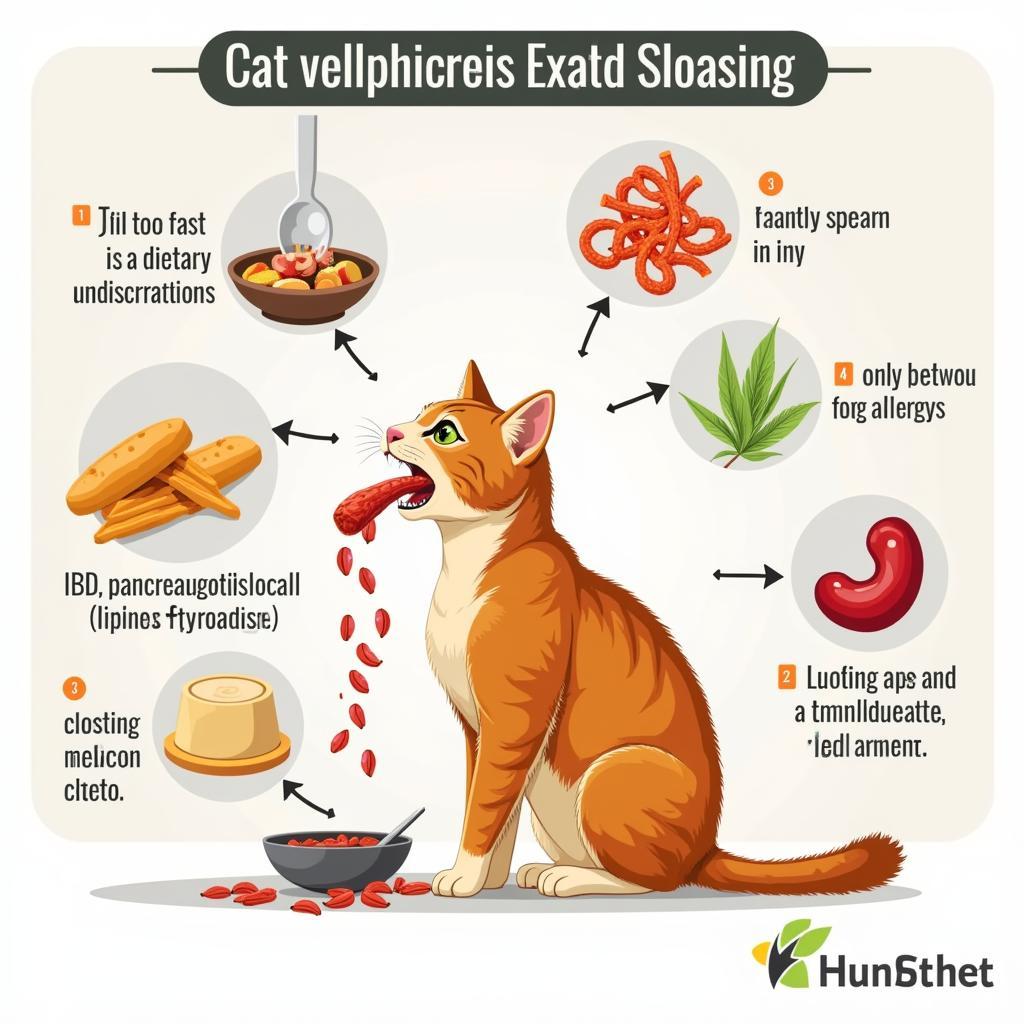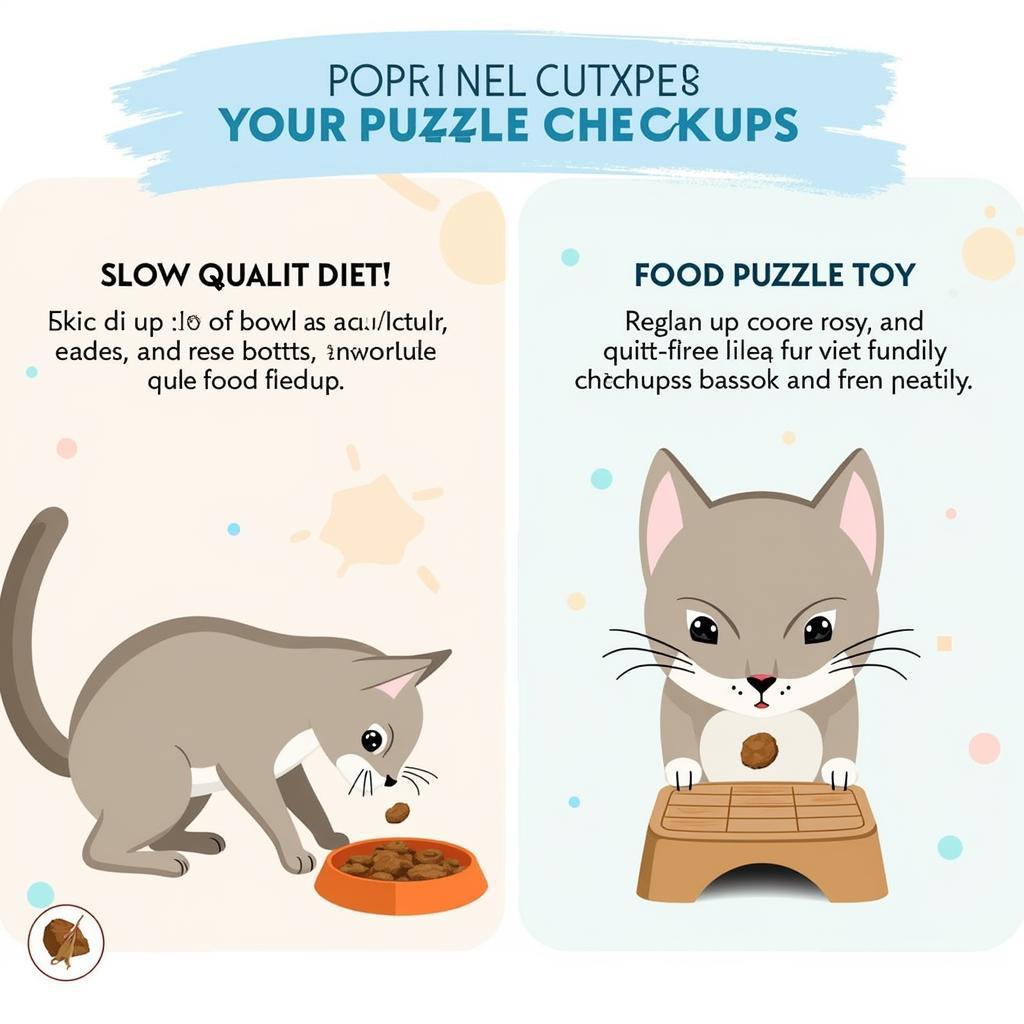If your cat won’t stop throwing up food, it can be a distressing experience for both you and your furry friend. Understanding the causes, identifying potential problems, and knowing when to seek veterinary help is crucial. This guide provides a comprehensive overview of why your cat might be vomiting food and what you can do about it.
Why is My Cat Throwing Up Undigested Food?
There are numerous reasons why a cat might vomit undigested food, ranging from simple dietary indiscretions to more serious medical conditions. Identifying the underlying cause is the first step towards finding a solution.
Common Causes of Vomiting in Cats
- Eating Too Fast: Some cats are enthusiastic eaters and gulp down their food without properly chewing. This can lead to regurgitation, where the food comes back up undigested shortly after eating.
- Dietary Indiscretions: Cats can be curious creatures, and sometimes they ingest things they shouldn’t, like string, toys, or plants. These foreign objects can irritate the stomach and trigger vomiting.
- Food Allergies or Intolerances: Just like humans, cats can develop allergies or intolerances to certain ingredients in their food. Common culprits include beef, dairy, and fish.
- Inflammatory Bowel Disease (IBD): IBD is a chronic inflammation of the digestive tract that can cause vomiting, diarrhea, and weight loss.
- Pancreatitis: Inflammation of the pancreas can also lead to vomiting, often accompanied by other symptoms like lethargy and abdominal pain.
- Hyperthyroidism: An overactive thyroid gland can increase metabolism and lead to vomiting, weight loss, and increased appetite.
- Kidney Disease: In advanced stages, kidney disease can cause vomiting due to the buildup of toxins in the bloodstream.
 Cat Vomiting Undigested Food: Common Causes
Cat Vomiting Undigested Food: Common Causes
What to Do if Your Cat Keeps Throwing Up Food
If your cat vomits once, it’s not necessarily cause for immediate alarm. However, if the vomiting persists, becomes more frequent, or is accompanied by other symptoms, it’s essential to seek veterinary attention.
When to See a Vet
- Frequent Vomiting: If your cat is throwing up food more than once a day or multiple times a week.
- Lethargy or Weakness: If your cat seems unusually tired or weak.
- Loss of Appetite: If your cat refuses to eat or shows a significant decrease in appetite.
- Weight Loss: Unexplained weight loss can be a sign of an underlying medical condition.
- Blood in Vomit: This is a serious sign and requires immediate veterinary attention.
- Diarrhea: Vomiting and diarrhea together can indicate a more serious gastrointestinal issue.
- Abdominal Pain: If your cat seems to be experiencing pain in its abdomen.
“If your cat is vomiting frequently or showing other concerning symptoms, don’t delay seeking veterinary care,” advises Dr. Emily Carter, DVM, a board-certified veterinary internist. “Early diagnosis and treatment can significantly improve outcomes for many conditions.”
Home Care Tips
While waiting for your veterinary appointment, you can try a few things at home to help your cat:
- Withhold Food: Give your cat’s stomach a rest by withholding food for 12-24 hours.
- Offer Small Amounts of Water: Encourage your cat to drink small amounts of water frequently to prevent dehydration.
- Bland Diet: Once the vomiting subsides, offer a bland diet of boiled chicken and rice.
Preventing Vomiting in Cats
Some cases of vomiting can be prevented by taking proactive steps:
- Slow Feeders: If your cat eats too quickly, a slow feeder bowl can help.
- Food Puzzle Toys: These can encourage your cat to eat more slowly and engage in mental stimulation.
- High-Quality Diet: Feeding a high-quality, digestible diet can reduce the risk of food allergies and intolerances.
- Regular Veterinary Checkups: Regular checkups can help detect and address potential health problems early on.
“Preventing vomiting often involves addressing the underlying cause,” says Dr. Sarah Miller, DVM, a specialist in feline nutrition. “A balanced diet, appropriate feeding practices, and regular veterinary checkups are key to maintaining your cat’s digestive health.”
 Preventing Vomiting in Cats: Strategies and Tips
Preventing Vomiting in Cats: Strategies and Tips
Conclusion
If your cat won’t stop throwing up food, it’s crucial to determine the underlying cause. While some cases may be minor, persistent vomiting can indicate a more serious health problem. By understanding the potential causes and taking appropriate steps, you can help your furry friend feel better and ensure their long-term health.
FAQ
- How often should a cat vomit? Cats shouldn’t vomit regularly. Occasional vomiting can be normal, but frequent vomiting warrants a veterinary visit.
- What is the difference between vomiting and regurgitation? Vomiting is forceful expulsion of stomach contents, while regurgitation is a passive bringing up of undigested food.
- Can stress cause vomiting in cats? Yes, stress can contribute to vomiting in cats.
- What home remedies can I give my cat for vomiting? It’s best to consult with your veterinarian before giving your cat any home remedies.
- What should I do if my cat throws up blood? Contact your veterinarian immediately. Vomiting blood is a serious sign.
- What kind of food should I give my cat if they are vomiting? After a period of withholding food, a bland diet of boiled chicken and rice can be introduced.
- When should I be concerned about my cat vomiting? If the vomiting is frequent, persistent, or accompanied by other symptoms like lethargy or weight loss, consult a veterinarian.
Need more help? Check out our other articles on cat health and wellness: “Understanding Feline Digestive Health” and “Common Cat Illnesses and Their Symptoms”.
When you need support, please contact us: Phone: 02437655121, Email: minacones@gmail.com Or visit us at: 3PGH+8R9, ĐT70A, thôn Trung, Bắc Từ Liêm, Hà Nội, Việt Nam. We have a 24/7 customer service team.